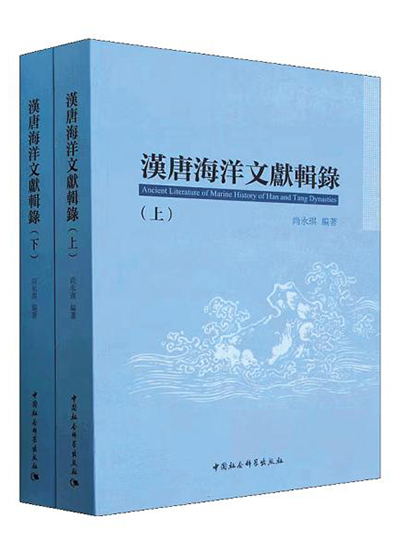Marine world of Han and Tang dynasties

Ancient Literature of Marine History of Han and Tang Dynasties
Traditional Chinese historiography, based on the conventional “land-centered perspective,” usually regards maritime civilization as a subset of agricultural civilization, viewing maritime activities as an extension of land activities. Historians tend to observe maritime civilization through a land-based mindset, treating maritime societal civilization as a subsidiary or supplement to orthodox history. As a result, records related to the sea, its environment, and maritime activities are often scattered and unsystematic.
Ancient Literature of Marine History of Han and Tang Dynasties, by Shang Yongqi, a professor from the School of Humanities and Communication at Ningbo University (NBU), compiles maritime-related materials from the official histories, philosophy, and literature of the Han and Tang dynasties, providing a valuable reference for the study of maritime history and civilization during this period.
The book includes maritime records from three historical periods: the Han Dynasty and the Three Kingdoms period; the Jin, Northern and Southern Dynasties; and the Sui, Tang, and the Five Dynasties. It compiles maritime references from various categories of literature, including official histories, unofficial histories, reference books, anthologies, collected works, and literary sketches. This compilation extracts materials related to the sea and maritime culture from the extensive literature of the Han and Tang periods, with official histories as the main framework. It also includes maritime legends from literary sketches, which are not constrained by the “orthodoxy” or “authenticity” of official historical texts. The official histories begin with the Records of the Grand Historian and end with the New History of the Five Dynasties. To ensure the systematization and completeness of historical data, certain materials from the pre-Qin period, the Qin Dynasty, and the Five Dynasties and Ten Kingdoms period are also included. Official histories, compiled by the imperial court, reflect the orthodox views of the ruling authorities, and the maritime records within them reveal the imperial attitudes toward the sea, as well as information on maritime transportation, warfare, and foreign relations.
Marine knowledge systems prior to the Tang Dynasty, particularly in Qin and Han, are characterized by the documentation of deities, natural wonders, or exotic phenomena. Materials such as literary sketches and biographies of monks, though not officially recognized, often contain stories and legends of maritime gods and supernatural events that reflect the perceptions and beliefs of coastal communities regarding the sea.
In terms of data collection, the book centers on the East China Sea, South China Sea, and Bohai Sea, emphasizing individuals active on the sea, events occurring within these maritime regions, maritime interactions, and marine resources. The recorded marine resources primarily focus on marine life such as fish, shellfish, and seaweed, while also documenting marine tributes and “sea medicines.” The latter specifically refers to plant and animal-based remedies explicitly identified as originating from the sea or coastal areas, including islands.
Dai Mengran is a research fellow from the Research Center of Buddhist Culture at NBU.
Edited by YANG LANLAN

 PRINT
PRINT CLOSE
CLOSE